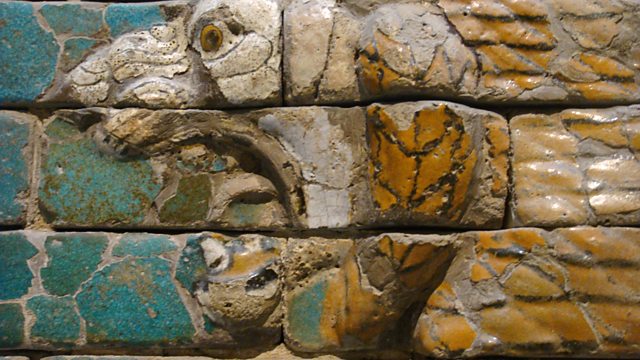Babylon, city of wonders
On the banks of the Euphrates in modern-day Iraq, Babylon was one of the wonders of the ancient world, notorious among Israelites yet celebrated as a cradle of civilisation
With its Hanging Gardens and huge walls, Babylon was celebrated as one of the Seven Wonders of the ancient world; to the Israelites enslaved there under Nebuchadnezzar, it was a lasting emblem of oppression and depravity, where they wept as they remembered Zion. It is only in the last two hundred years that Babylon's fuller history has been unearthed, both the remains of its buildings and a huge number of clay tablets covered in writing, revealing a complex world that created epic stories, powerful people and an understanding of science and the stars, and it was their 60 based numbering system that led to our 60 seconds in a minute and 60 minutes in an hour. It has been called a cradle of civilisation.
Bridget Kendall explores the reputation of Babylon and its contribution to the world with four experts: Frances Reynolds, Shillito Fellow in Assyriology at the Oriental Institute, University of Oxford; Grant Frame, Professor of Assyriology at the University of Pennsylvania and Curator of the Babylonian Section of Penn Museum; Daniel Schwemer, Chair of Ancient Oriental Studies at the University of WΓΌrzburg; and Jaafar Jotheri, Assistant Professor in Geoarchaeology at the University of Al-Qadisiyah, Iraq.
(Image: Detail of the Ishtar gate, Babylon. Credit: Veronique Durruty/Gamma-Rapho via Getty Images)
Last on
More episodes
Previous
Broadcasts
- Thu 4 Jun 2020 09:06GMTΒι¶ΉΤΌΕΔ World Service
- Thu 4 Jun 2020 23:06GMTΒι¶ΉΤΌΕΔ World Service
- Sun 7 Jun 2020 13:06GMTΒι¶ΉΤΌΕΔ World Service East and Southern Africa & West and Central Africa only
- Sun 7 Jun 2020 14:06GMTΒι¶ΉΤΌΕΔ World Service except Americas and the Caribbean, East and Southern Africa, South Asia & West and Central Africa
- Mon 8 Jun 2020 03:06GMTΒι¶ΉΤΌΕΔ World Service
Podcast
-
![]()
The Forum
The programme that explains the present by exploring the past


